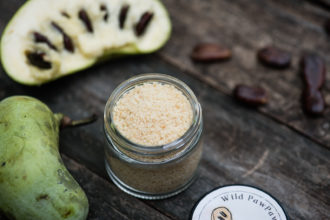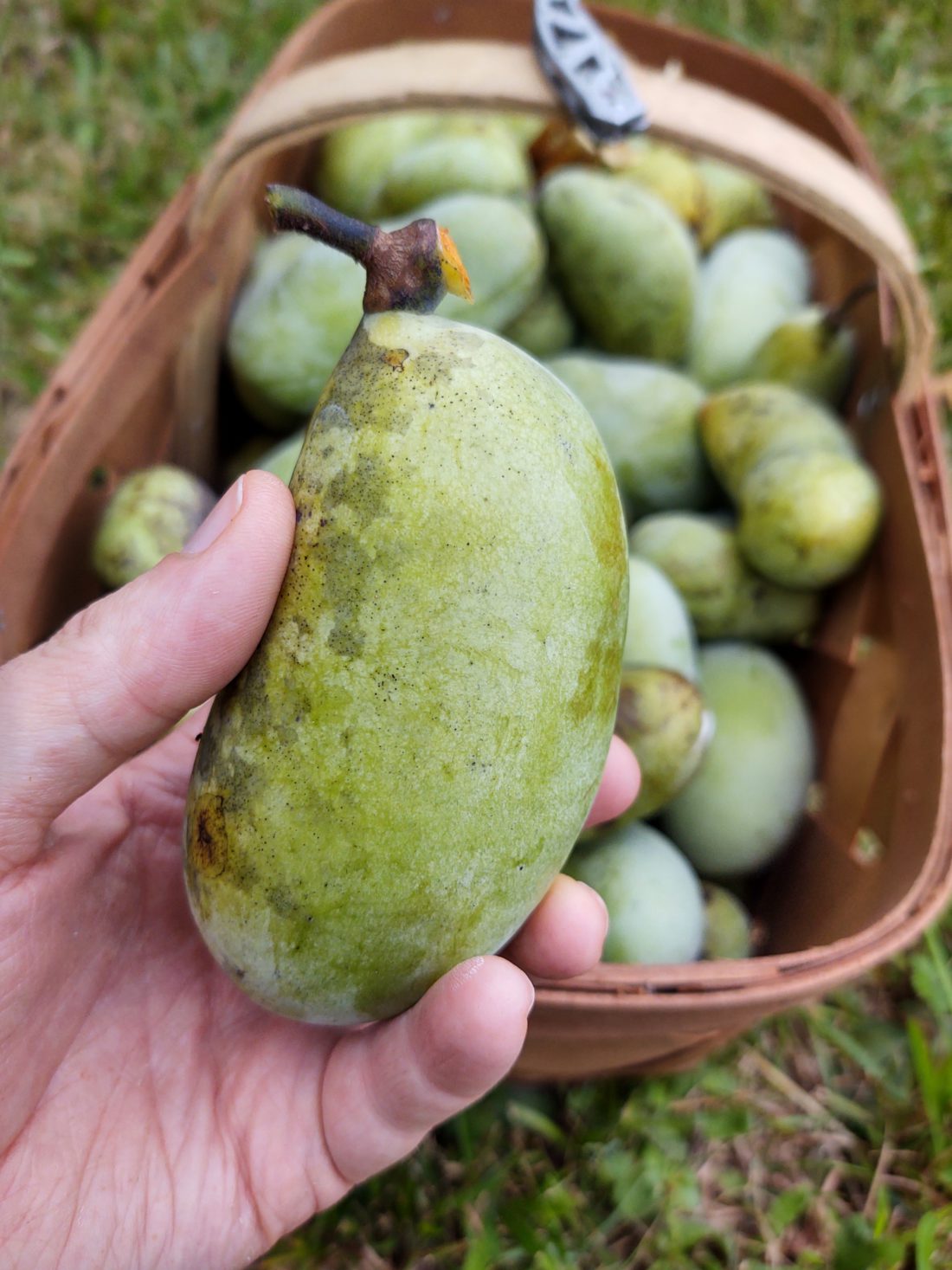A traditional folk song starts like this: “Where, oh where, is pretty little Susie?”
The answer, of course, is that little Susie may be found “way down yonder in the pawpaw patch, pickin’ up pawpaws, puttin’ ’em in her pockets.”
In modern times, many people have forgotten about the pawpaw. The large, yellowish-green fruit, although native to the Eastern United States, is hard to come across. Pawpaws can’t be found in stores because of their ultrashort shelf life — a couple days at room temperature, about a week in the refrigerator — so they’re usually harvested by hand from patches in the wild.
And people who do know about a pawpaw patch tend to keep it a secret. I once stumbled upon a big grove of pawpaw trees, and within minutes a woman appeared on a four-wheeler and claimed them as hers, the star ingredient in pies she makes for her family every fall. She said I could have a few, then, broke out singing the old song: “Pickin’ up pawpaws…”
The fruit is an oddity, but in a city with an unofficial tagline of “Keep Asheville Weird,” it’s perhaps natural that some are drawn to working with pawpaws. A number of local businesses are making pawpaw products to give more people a taste of this indigenous American delight.
Edible endeavors
Justin Holt, a member of the Nutty Buddy Collective, calls pawpaws a “strange fruit to encounter in the mountains of North Carolina.” That’s because a pawpaw looks similar to the tropical bulk of a mango and tastes like one too, combined with mellow, custard-textured banana. “I like the flavor a lot. I can eat a lot of pawpaws, more pawpaws than most,” he says.
Holt’s business, which aims to bring native fruits and nuts to Westen North Carolina tables, seeks to restore a bit of the pawpaw’s former popularity — he notes that President Thomas Jefferson even grew the fruit in the garden of his Monticello plantation in Virginia. The collective is growing a patch of about a dozen pawpaw trees right now, with the daydream of turning the fruit into commercial products. He says puddings, pie and ice cream are all delectable uses.

And as part of its locally sourced lineup, Candler-based Well Seasoned Table crafts a seasonal pawpaw-infused sugar, which this year was released Sept. 17. The unique product has drawn national attention, recently earning a nod on Taste of the South magazine’s 2021 Taste 50 list.
Katie McDonald, the company’s general manager, says the sugar uses about 30-40 pounds of pawpaws per season. These usually come from local patches, but because many are bare this year (potentially because of a late frost) Well Seasoned Table is relying on a Virginia-based friend to supply the rare fruit.
“The season on pawpaws is short, so we only source what we need for one large batch. We release it in the fall each year, as a special taste of the area/season,” McDonald notes. “We also do a good bit of social media posting/marketing so people know when we put our sugar out.”
Pawpaw potables
Co-owners Amie Fields and Lyndon Smith of the Botanist and Barrel, a cidery and winemaker with a tasting room at 32 Broadway in Asheville, use every bit of pawpaw fruit they can get their hands on. They work with local foragers — as well as Wynn Dinnsen, a one-man-show farmer who has a pawpaw orchard in a supersecret Chatham County location.
Smith believes that Dinnsen’s orchard may be the only commercial pawpaw farm in the South, and the product is in high demand. “It took us five years to build the relationship,” he says. “This poor guy gets harassed all the time, it’s that bad.”
While Smith initially declined to disclose Botanist and Barrel’s source, Dinnsen’s 250-tree orchard is the only pawpaw farm featured on the N.C. Cooperative Extension website, and the farmer confirmed that he provides pawpaws to the cidery in an email to Xpress. Dinnsen noted that he has removed his address from his own website and prefers to deal with large repeat buyers, such as Durham’s Fullsteam Brewery and Fair Game Beverage Co. in Pittsboro.
This year, Fields and Smith hope to source up to 600 pounds of pawpaws, going so far as to send their own employees to help Dinnsen pick them. Harvesting is not easy because pawpaws don’t ripen all at once, so getting that much fruit may take a few trips of picking 100 pounds at a time.
On making pawpaw cider, Smith says, “We need to let things age and mellow.” A batch made two years ago, for example, hung around for up to 18 months before bottling. “If it’s released earlier, when it’s really young, it comes out sweeter, a custardy candy mango flavor, whereas the aged pawpaw cider has a tart, sour flavor with a residual sweetness that gives texture to the cider,” Fields explains.
With the season’s pawpaw haul, Botanist and Barrel plans to brew up to 700 gallons of cider, which will be spread across three varieties: pawpaw jasmine, which includes jasmine tea and develops a passion fruit flavor; pawpaw ginger vanilla, with baking spice that Smith says “tricks your mind into balancing the tartness” of the pawpaw; and a regular pawpaw cider with apples.
“Pawpaw has a cult following. There is such interest in that fruit, and in general, native fruit that has been forgotten,” Smith says. While Botanist and Barrel has sold the last of its available pawpaw ciders this fall, the next batch of pawpaw jasmine is expected to be released summer 2022.
“It’s my favorite cider that we make,” Fields adds.




Before you comment
The comments section is here to provide a platform for civil dialogue on the issues we face together as a local community. Xpress is committed to offering this platform for all voices, but when the tone of the discussion gets nasty or strays off topic, we believe many people choose not to participate. Xpress editors are determined to moderate comments to ensure a constructive interchange is maintained. All comments judged not to be in keeping with the spirit of civil discourse will be removed and repeat violators will be banned. See here for our terms of service. Thank you for being part of this effort to promote respectful discussion.